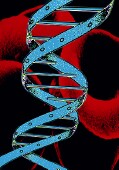
THURSDAY, Sept. 27 (HealthDay News) — Men with certain gene mutations may be at higher risk for erectile dysfunction after receiving radiation therapy for prostate cancer than other patients, a new study suggests.
Although far from clinical use now, genetic analysis may someday play a role in personalizing treatment for prostate cancer patients, researchers said.
“We believe there are genetic factors that make patients more likely to develop complications from treatment,” said lead researcher Barry Rosenstein, from the department of radiation oncology at Mount Sinai School of Medicine in New York City.
Erectile dysfunction, or impotence, is a common side effect of radiation therapy, he said. Urinary problems and rectal bleeding also can arise from radiation therapy, he added.
“In this paper, we found 12 markers we feel are strongly associated with developing erectile dysfunction, but also we found a similar number of other markers associated with urinary problems and rectal bleeding,” Rosenstein said.
The goal of the research is to develop a test that will help patients and doctors choose the best treatment options, he explained.
Combining genetic factors with other considerations such as cancer stage and results from other treatments, doctors and patients will have a better way of individualizing a treatment plan, Rosenstein suggested.
“The results are looking good, but they are not ready to be included in a clinical trial,” Rosenstein said. That won’t happen for three to five years, he added.
Rosenstein believes these genetic markers add to other known risk factors for these side effects for a more complete assessment of risks.
The report was published online Sept. 27 in the International Journal of Radiation Oncology, Biology, Physics.
For the study, Rosenstein’s team looked at almost 600 men treated with implanted and/or external beam radiation and hormone therapy for prostate cancer. Of this group, 260 experienced erectile dysfunction after treatment.
The researchers looked for differences in the genes of the men who became impotent and those who didn’t.
The investigators found 12 gene mutations called single nucleotide polymorphisms (SNPs) associated with a greater risk of developing erectile dysfunction after radiation therapy for prostate cancer.
However, while the researchers uncovered an apparent connection between the mutations and erectile dysfunction, they did not prove a cause-and-effect relationship.
Dr. Anthony D’Amico, chief of genitourinary (uro-genital) radiation oncology at Brigham and Women’s Hospital in Boston, said the research is valuable. “These type of studies are very important and will, I think, be the future of how we decide what treatments are best in which individuals,” he said.
“It will as well identify who has more sensitivity to one treatment or another with regard to side effects,” he added.
D’Amico cautioned that this is preliminary data so it needs to be verified in other men, he said.
“In addition, we have to make sure, even if it is validated, it provides information that we don’t already have,” he noted.
To be useful, a genetic analysis needs to identify men who don’t already have other known risk factors for erectile dysfunction, D’Amico explained. Those other risk factors include obesity and diabetes.
Beyond that caveat, genetic analysis is the future of individualized treatment for prostate cancer, he said.
The U.S. National Cancer Institute estimates that in 2012 nearly 242,000 men will be diagnosed with prostate cancer and more than 28,000 will die from the disease.
More information
For more information on prostate cancer, visit the U.S. National Cancer Institute.

